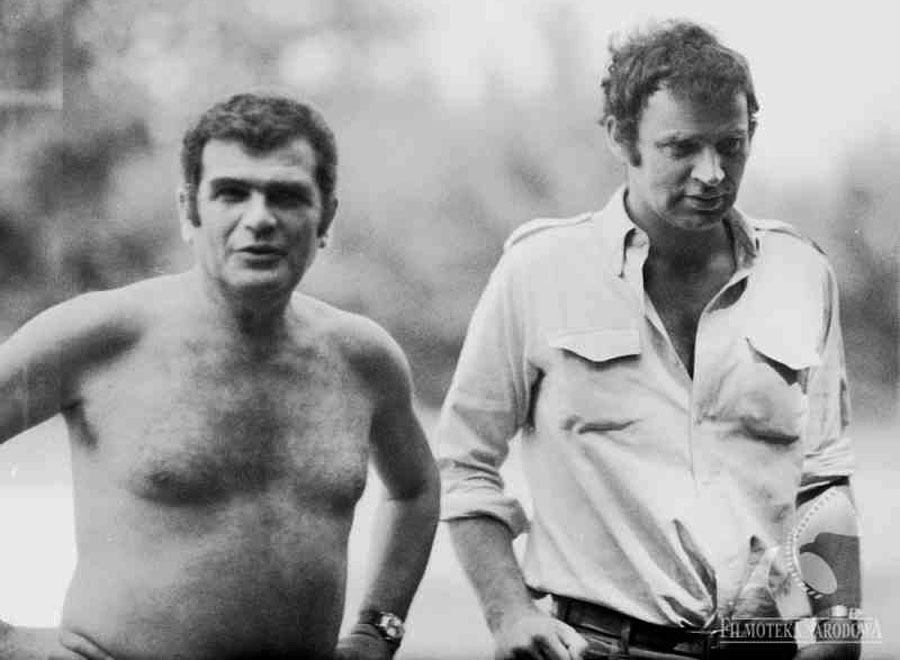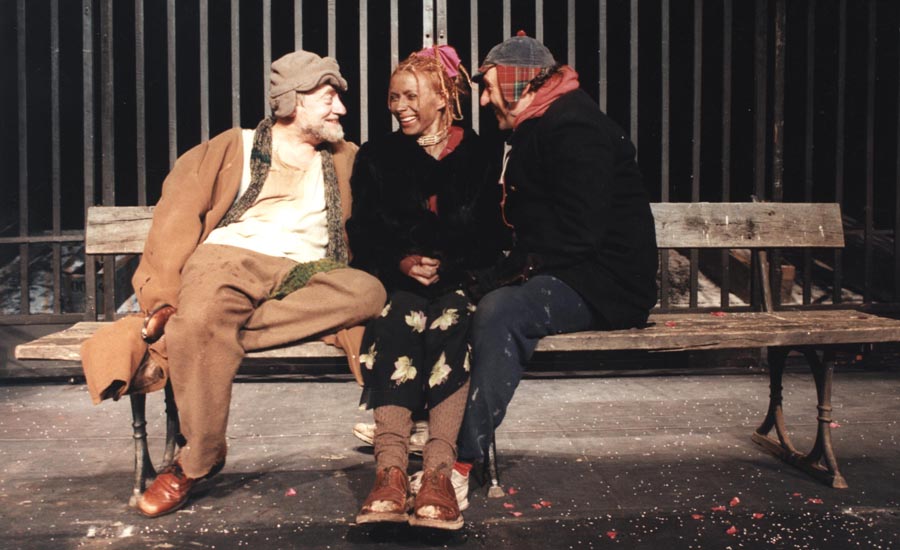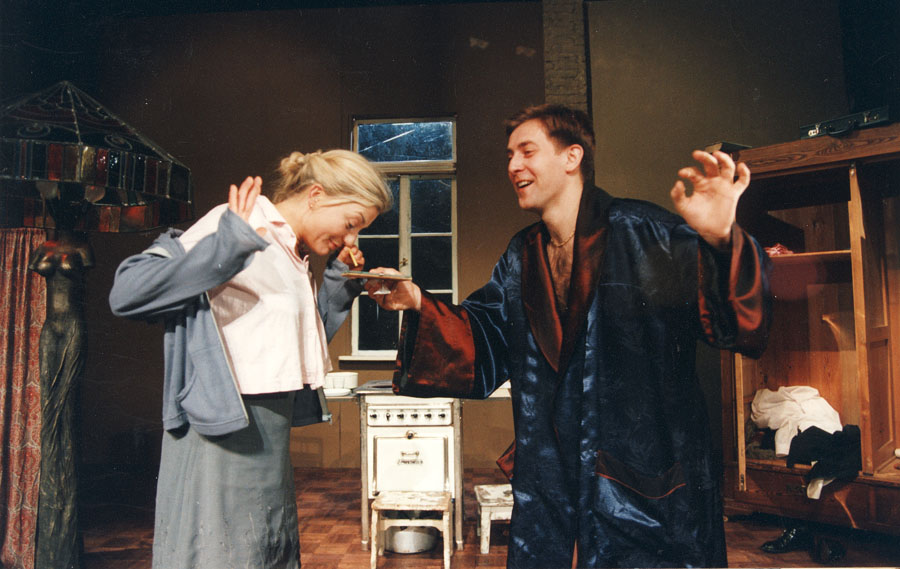Table of contents: Cinema | Theatre | International Career | Cultural Context | Works
He launched his career as an author with superb short stories in which he described, with great insight, the cultural and social phenomena of the 1960s and ‘70s. With a winning irony, Głowacki laughs at the materialism and lower-middle-class prejudices and snobbism of Warsaw at that time. The short-story collections The Nonsense, Spinner (1968) and The New La-ba-da Dance (1970) made the young writer extremely popular. His fame as a scoffer and lampooner was also based on the regular publication of satirical articles, which were, on the whole, devoted to social phenomena.
Film Collaborations
In the late 1960s and early 1970s, Janusz Głowacki took part in several much-talked-about films as an actor and screenwriter. These included co-writing the screenplay for Marek Piwowski’s Psychodrama (1969) and The Cruise (1970), and writing the screenplay for Andrzej Wajda’s Hunting Flies (1970), and Janusz Morgenstern’s This Love Must Be Killed (1972). In 1999, Głowacki’s screenplay, Hairdo, won the Tony Cox Screenwriting Award in the Nantucket Film Festival Screenplay Competition.
 Janusz Morgenstern (director) i Janusz Głowacki (screenwriter) on the set of the film We Have to Kill this Love, 1972, photo: Studio Filmowe Zebra / Filmoteka Narodowa/www.fototeka.fn.org.pl
Janusz Morgenstern (director) i Janusz Głowacki (screenwriter) on the set of the film We Have to Kill this Love, 1972, photo: Studio Filmowe Zebra / Filmoteka Narodowa/www.fototeka.fn.org.pl
Towards Theatre
Głowacki’s early attempts at playwriting originate from this period, too, including the first of his plays, Adultery Punished (pre-première at the STS Theatre, Warsaw, 1972). His subsequent plays were Chop (performed in 1976), Soccer (Teatr Powszechny, Warsaw, 1977), and Cinders (pre-première at Teatr Wspolczesny in Szczecin, 1979). These are works of drama in the realist vein, examples of a fine observational humour moving in the direction of the grotesque. When Cinders was staged at The Royal Court Theatre in London in 1981, The Guardian wrote that it was ‘the best fringe production…of the year’. In 1984, the play was staged at the New York Shakespeare Festival, starring Christopher Walken, and directed by John Madden. In The New York Times, Frank Rich wrote:
Extremely clever and provocative writing... Mr Głowacki has a keen ability to mine the dark absurd humor in the language of terror, and makes elegant Kafkaesque comedy out of his nation’s ongoing nightmare of repression.
International Career
Cinders has been staged in Belgrade, Frankfurt, Seoul, Moscow, St. Petersburg, Buenos Aires (where it won the Molière Award for the best production of 1986), and in the National Theatre in Taipei, as well as in more than twenty theatres across the US. Like many Polish artists after the introduction of martial law in Poland, Janusz Głowacki decided to remain abroad. He settled in New York where he developed his playwriting talent, gaining the attention of American theatre circles with the play, Hunting Cockroaches (staged in 1986, with the great Arthur Miller helping to find the playwright a willing theatre). In an interview with Eva Nagorski in the Warsaw Voice (February 12, 1995), Głowacki describes the play as ‘a comedy, a very funny play about a very serious subject: two people, a famous writer and an actress, who lose everything except their accents. And they landed in this new country, lost in this different culture, language, city, everything. I showed how surreal this situation was for these people’. In 1986, Hunting Cockroaches was listed as an Outstanding New Play by the American Theatre Critics Association, and also received the Joseph Kesselring Award (1987) and the Hollywood Drama League Critics Award (1987). The play has been produced over forty times in the US, as well as in Sydney, Toronto, Marseilles, Lyon, Geneva, and Brussels. Głowacki’s next, even more significant achievement, was Antigone in New York (première in Warsaw, 1992), a play which enjoyed enormous success in Europe and the US (it was listed in Time magazine as one of the best ten plays of 1993). The play tells the story of homeless immigrants in New York’s Tompkins Square Park, a place which Głowacki describes in an interview with the Warsaw Voice as:
A very cruel, disappointing, awful microcosm of the world because it’s a Puerto Rican alley, Polish alley, Ukrainian, Jamaican, Cuban. I spent a lot of nights and days in this park. Some were funny, some were nightmarish. I drank and talked with them, became friends.
 Scene from the play Antigone in New York, directed by Dariusz Banek, 1993, photo: Zygmunt Rytka / from the archives of the Stefan Jaracz Ateneum Theatre, Warsaw
Scene from the play Antigone in New York, directed by Dariusz Banek, 1993, photo: Zygmunt Rytka / from the archives of the Stefan Jaracz Ateneum Theatre, Warsaw
The contemporary Antigone, the Puerto Rican Anita, repeats the gestures of her predecessors, yet the strength of this work is that the writer succeeds in creating a universal allegory. ‘I think it’s a very warm play’, says the author, ‘full of feelings. It’s a love story actually’. Antigone in New York has been staged in Prague, St. Petersburg, Moscow, Bonn, Yale (Repertory), Atlanta, New York (Vineyard Theatre), Mexico City, Croatia, Lithuania, Paris (where it received Le Balladine Award for the best play of 1997) and in theatres across Poland. The play has been translated into 20 languages. Głowacki’s other plays include Fortinbras Got Drunk, which enjoyed its American première at the Fountainhead Theatre in Los Angeles in 1990, and was staged in Moscow, Kraków, Sarajevo, London, and Los Angeles, and The Fourth Sister, which was premièred in Warsaw in 2000, and won the Grand Prize at the International Theatre Festival in Dubrovnik in 2001. He has also written a number of one-act plays including A Walk Before Dawn, Journey to Gdańsk (1982), and Home Section (1995, and published, by Applause, in ‘The Best American Short Plays ‘95-96’). He has also received the Drama League of New York Playwriting Award, and a Guggenheim Fellowship. What’s more, the world-famous theatre expert, Jan Kott, wrote of Antigone in New York that it is one of the three most important Polish plays of recent decades and Głowacki deserves to be placed alongside the greatest of modern Polish dramatists – Sławomir Mrożek and Tadeusz Różewicz.
 Scene from The Fourth Sister by Janusz Głowacki, directed by Władysław Kowalski, 1999, The Zygmunt Hübner Powszechny Theatre, Warsaw, photo from the archives of the Powszechny Theatre
Scene from The Fourth Sister by Janusz Głowacki, directed by Władysław Kowalski, 1999, The Zygmunt Hübner Powszechny Theatre, Warsaw, photo from the archives of the Powszechny Theatre
Cultural References
Głowacki has lectured at the universities of Yale and Columbia and has continued to write fiction. His early novel, Give Us this Day, was inspired by the author’s experiences during the strike at the Gdańsk shipyard in August 1980, which resulted in the birth of the Solidarity movement. Blocked by censors, the novel was published underground in 1981, and, later, in France, England, West Germany, Switzerland, Turkey and Greece. In 1985, Give Us this Day was published by St. Martin’s Mark in the US. His next novel was The Last Supper. Henryk Dasko writes: ‘The artistic prototype of Janusz Głowacki’s novel, The Last Supper, is the film Citizen Kane by Orson Welles. Głowacki’s protagonist is John Jefferson Caine, whose name is pronounced like the name of Welles’s hero. Just as in Welles, Caine is a media mogul. The action of Głowacki’s book is set almost a century later, so Caine can manipulate public opinion in a far more refined manner by staging events which his TV channels then broadcast’. Głowacki’s autobiographical novel, Z Głowy (Berthelsman Publishing, Warsaw, 2004) was a number one bestseller in Poland for several weeks and was nominated for the 2005 Nike Literary Award. His latest novel, Goodnight Dżerzi (2010), creates an elaborate psychological and social portrait in which scenes from Jerzy Kosiński’s life intertwine with the story of the narrator who is working on a screenplay about the writer. The narrator is based on Głowacki himself, who was a close friend of Kosiński’s. As Bartosz Marzec writes:
The author of ‘Being There’ believed in coincidence. Taking that into consideration, Głowacki wonders whether Jersey’s biography was the contemporary version of the Oedipus myth. The Gods told him that he would kill his father, marry his mother and end up tragically. At the same time, just for the sheer fun of it, they let him believe he was free, successful, and gave him a family. “And then things fell apart”, as Głowacki writes. Similarly, Kosiński was born when Hitler came into power. “At this moment, he and the entire Jewish nation were sentenced to death by the divine decree. Yet, somebody above decided it would be fun to save the boy for now, let him make a brilliant career, and then come back for him. The role of Erinys, the goddesses of revenge, was played by the journalists...”
Głowacki wrote the script for Andrzej Wajda’s movie Wałęsa: Man of Hope about Lech Wałęsa, an opportunity which also resulted in the book Przyszłem, czyli jak pisałem scenariusz o Lechu Wałęsie dla Andrzeja Wajdy, in which Głowacki presented a more subjective take on the engineer-turned-politician’s story and the social backdrop of his activities.
In October 2011, Głowacki was named Warsaw’s Author of the Year in 2011. The most prestigious category of the Capital of Warsaw Prize is the title of the Warsaw Creator, given to Głowacki for his lifelong literary achievement. In November 2011, Głowacki won The Czesław Miłosz Award, given by the USA embassy in Poland for contributions to furthering friendly relations between Poland and the U.S.
Janusz Głowacki passed away on 19th August 2017.
Selected Publications
- Wirowska nonsensu / The Nonsense Spinner, Warsaw: PIW, 1968.
- Nowy taniec La-ba-da i inne opowiadania / The New La-ba-da Dance and Other Stories, Warsaw: PIW, 1970.
- Cudzołóstwo ukarane / Adultery Punished, Dialog, 1972.
- My Sweet Raskolnikov.Obciach / My Sweet Raskolnikov. Chop, Warsaw: PIW, 1977.
- Mecz / Soccer, Dialog, 1976.
- Moc truchleje / Give Us This Day, Warsaw: Krag, 1981.
- Polowanie na karaluchy / Hunting Cockroaches, (1986) Dialog, 1990.
- Fortynbras sie upił / Fortinbras Gets Drunk, Dialog, 1990.
- Antygona w Nowym Jorku / Antigone in New York, Dialog, 1992.
- Ścieki, skrzeki, karaluchy. Utwory prawie wszystkie / Sewers, Frog-spawn, Cockroaches. Nearly Complete Works, Warsaw: BGW, 1996.
- Czwarta siostra / The Forth sister, Warsaw: Czytelnik 1999
- Ostatni cieć / The Last Super, Warsaw: Czytelnik, 2001
- Nie mogę narzekać / I cannot complain, Warsaw, Rosner & Wspólnicy 2003
- Z głowy / Off the top of /My/ Head, Warsaw, Świat Książki 2004. Nominated for the 2005 Nike Literary Award
- Jak być kochanym / How to be loved, Warsaw, Świat Książki 2005.
- Pięć i pół / Five and A Half, Warsaw: Świat Książki, 2007.
- Good night, Dżerzi, Warsaw: Świat Książki, 2010.
- Przyszłem, czyli jak pisałem scenariusz o Lechu Wałęsie dla Andrzeja Wajdy, Warsaw: Świat Książki, 2013.
Selected translations
- English: Fortinbras Gets Drunk, New York, 1990; Antigone in New York, New York, 1993; Give Us This Day (Moc truchleje), London, 1983; Hunting Cockroaches (Polowanie na karaluchy), New York, 1987;
- French: My sweet Raskolnikov et autres rÉcits, Montricher: Editions Noir sur Blanc, 1989; La greve (Moc truchleje), Paris, 1982; La chasse au cafard (Polowanie na karaluchy), Lyon, 1989;
- German: Bestrafter Ehebruch (Cudzołóstwo ukarane), Berlin: Henschel, 1974; Ich kann nicht klagan (Moc truchleje), Zürich: Unionsverlag, 1983;
- Hungarian: Légyvadászat (Nowy Taniec la-ba-da), Budapest, 1973; Svábbogárvadaszat, Budapest, 1989;
- Estonian: Paradis, Tallin, 1981;
- Czech: Utkáni (Mecz), Prague, 1979;
Author: Krystyna Dąbrowska, December 2009. Edited and updated January 2012.